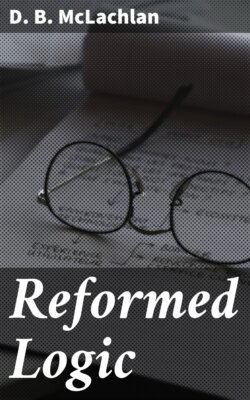Читать книгу Reformed Logic - D. B. Mclachlan - Страница 5
На сайте Литреса книга снята с продажи.
I—RELATION OF BERKELEY'S PHILOSOPHY
TO OTHER SYSTEMS
ОглавлениеTable of Contents
Philosophies are either Ideal or Substantial. The ideal are those which resolve all things, actual and possible, into thought or consciousness. They seek to find in consciousness the reason and meaning of itself, or, if this be impossible, to account for each item in consciousness by defining its relation to some other item, or to some general mass of consciousness. This type of philosophy includes German transcendentalism and idealism, and some species of Buddhist and Persian metaphysic. European idealists are seldom consistent, for at the basis of their philosophies (or at the apex) they place God, who is not an item of human consciousness, actual or potential, and who therefore occupies, whether it be admitted or not, the relation of substance to human thought.
Substantial philosophies affirm that thought invariably inheres in some sort of Substance, for whose service it exists. It is incapable of independent being, and cannot be understood abstracted from its substance. It is intermittent, called up when wanted, and is liable to variation and aberration.
Substantialists differ however as to what the substance of human intelligence is. Some hold that it is the human body. Consciousness exists, they argue, for the use of the body and varies with its condition. This class of philosophers may be subdivided into Materialists and Metaphysicians (including logicians).
Materialists believe that consciousness is a product of the physical body—has therefore no existence before the body is formed or after it is dissolved. It is really as physical as the teeth or hair.
In metaphysic the intelligence is supposed to have a principle of existence apart from the body, and does not, or need not, share the fate of the body. The body is nevertheless regarded as the substance or superior fact during the union of the two. This is an eminently inconsistent philosophy, for if consciousness has an existence apart from body it must be in some other substance, and if so its relations to that substance are more important than its relations to the body, and should be the first object of inquiry. Metaphysic is in its development an idealism, since the connection admitted between body and thought is too slight to afford a sufficient explanation of intelligence, and no other substantial relation is known.
The notion that an invisible immaterial substance may underlie consciousness has occurred to some philosophers, among others to the illustrious Berkeley. His theory of Vision, which has never been refuted or even weakened, is founded on this hypothesis.
Berkeleyan substantialism combines the characteristic features of the other theories, and affords an easy solution of many difficult problems in philosophy. It has in common with idealism—whence it is sometimes, but erroneously, called by that name—that it regards all material bodies and things as facts or items of consciousness. It agrees with materialism that a substance is essential to consciousness, and that the consciousness of man serves the needs of his body, though that is not the highest use to which it can be put. It confirms the metaphysical view that intelligence is not, in its abstract or essential character, dependent on the body, and may therefore survive the body.
This is the theory on which the following logic is based: I shall refer to it briefly as Substantialism.
